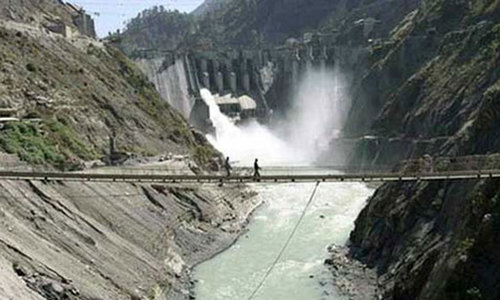SC looking for ways to build ‘Pakistan dam’, says CJP
ISLAMABAD: The Supreme Court was informed on Wednesday that construction work on the 4,500MW Bhasha dam could have commenced in 2001 but the lobby behind the 3,600MW Kalabagh dam did not let this happen.
This lobby was of the opinion that if the Kalabagh dam was not built then no other dam should be allowed to be constructed, said Imtiaz Ali Qazilbash, an expert who appeared before a three-judge bench headed by Chief Justice Mian Saqib Nisar.
The bench had taken suo motu notice of a report furnished by the Pakistan Council of Research in Water Resources on water scarcity in the country as well as a petition filed by Barrister Zafarullah Khan of the Watan Party for construction of the Kalabagh dam.
According to expert, country incurring loss of Rs196 billion each year in absence of Kalabagh dam
During the hearing the chief justice of Pakistan clarified that the Supreme Court was not asking for the construction of the Kalabagh dam per se, but was looking for ways to build a “Pakistan dam”. He said that consensus and unanimity among the four provinces was necessary for building dams.
Chief Justice Nisar said that 3,500 people were displaced when the Mangla dam was constructed, whereas 6,300 persons had to leave their native areas when the Tarbela dam was built. In comparison, 50,000 to 60,000 people might be affected if the Kalabagh dam was built.
Constructing the Bhasha dam would help enhance the storage capacity of Tarbela Lake, he said.
He recalled how during the period from 1981 to 1984 thousands of engineers came up with proposals to build some 2,000 dams in the country.
Mr Qazilbash recalled how Gen Azhar Farooq, a former chairman of the Water and Power Development Authority, used to say that even though a Wapda chief was replaced after four years or so no dam was built in that period of time.
He also lamented that corruption crept into the affairs of Wapda during the regime of military dictator Gen Ziaul Haq. As a result, several projects like Munda, Dasu and Bhasha dams suffered.
A former Wapda chairman, Shamsul Mulk, told the court that Kalabagh dam was “a lifeline for Pakistan” and said the country faced a loss of Rs196 billion each year in the absence of the dam because that was the amount the country incurred in generating electricity through furnace oil. For Tarbela and Mangla dams the cost of generating one unit of electricity came to only Rs1.5.
Mr Mulk pointed out that India had built 4,000 dams and China 22,000 and recalled how during a meeting with him a veteran politician, Begum Nasim Wali Khan, had declared “we will oppose Kalabagh dam even if it is established that building it will be very beneficial”.
Explaining the dam’s benefits, Mr Mulk emphasised that China was generating around 30,000MW of electricity from dams.
CJP Nisar expressed dismay over the democratic governments’ failure to reach a consensus on the Kalabagh dam and asked about the consequences of not constructing dams.
Later, speaking at a seminar entitled “Water Crisis and Construction of Dams”, the chief justice said the apex court would take the matter very seriously because it was its duty to ensure provision of fundamental rights to the people.
Published in Dawn, June 28th, 2018













































